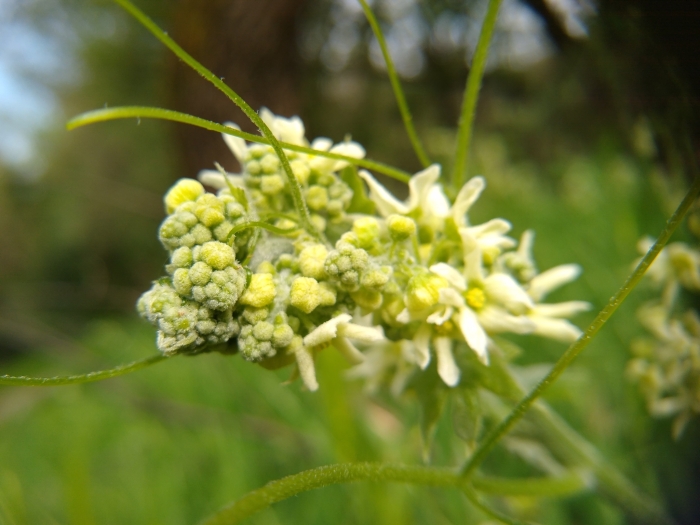California Manroot
(Marah fabacea)
California Manroot (Marah fabacea)
/
/

© Quinn Shemet
CC BY 4.0
Image By:
© Quinn Shemet
Recorded By:
Copyright:
CC BY 4.0
Copyright Notice:
Photo by: © Quinn Shemet | License Type: CC BY 4.0 | License URL: http://creativecommons.org/licenses/by/4.0/ | Uploader: sqshemet | Publisher: iNaturalist |






















Estimated Native Range
Summary
Marah fabacea, commonly known as California manroot or bigroot, is a perennial vine native to California’s diverse habitats, including riparian zones, chaparral, and lower montane forests. It thrives in areas with seasonal water flow, such as streams and washes, and can be found at elevations up to 5249 feet (1600 meters). This vigorous plant has stout, climbing stems that can reach lengths of up to 20 feet (6 meters), supported by spiraling tendrils. From late winter to early spring, it produces yellowish-green to white flowers that are modest in size and not particularly showy. The fruit is large, spherical, and covered in spines, resembling a medieval mace. The plant’s extensive root system features large, starchy tubers.
California manroot is valued for its ability to stabilize soil and provide cover in restoration projects. It is not typically used in ornamental horticulture due to its aggressive growth and large, inedible fruit. In cultivation, it requires minimal care once established, tolerating drought and a variety of soil conditions, though it prefers well-drained soils. It can be grown in full sun to part shade. Gardeners should be aware that the plant can become invasive and difficult to remove due to its deep and extensive tuber system. There are no popular garden cultivars of this species. Historically, the tubers were used by Native Americans to immobilize fish, a testament to their toxic properties.CC BY-SA 4.0
California manroot is valued for its ability to stabilize soil and provide cover in restoration projects. It is not typically used in ornamental horticulture due to its aggressive growth and large, inedible fruit. In cultivation, it requires minimal care once established, tolerating drought and a variety of soil conditions, though it prefers well-drained soils. It can be grown in full sun to part shade. Gardeners should be aware that the plant can become invasive and difficult to remove due to its deep and extensive tuber system. There are no popular garden cultivars of this species. Historically, the tubers were used by Native Americans to immobilize fish, a testament to their toxic properties.CC BY-SA 4.0
Plant Description
- Plant Type: Vine
- Height: 1-2 feet
- Width: 1-2 feet
- Growth Rate: Rapid
- Flower Color: White, Green
- Flowering Season: Spring
- Leaf Retention: Deciduous
Growth Requirements
- Sun: Full Sun, Part Shade
- Water: Medium
- Drainage: Medium, Fast
Common Uses
Bee Garden, Bird Garden
Natural Habitat
Native to California’s riparian zones, chaparral, and lower montane forests
Other Names
Common Names: Wild Cucumber, Coast Manroot, Valley Manroot
Scientific Names: , Marah fabacea, Echinocystis fabacea, Echinocystis fabacea var. agrestis, Echinocystis fabacea var. inermis, Echinocystis inermis, Echinocystis scabrida, Marah fabacea var. agrestis, Marah fabacea var. fabacea, Marah fabaceus var. agrestis
GBIF Accepted Name: